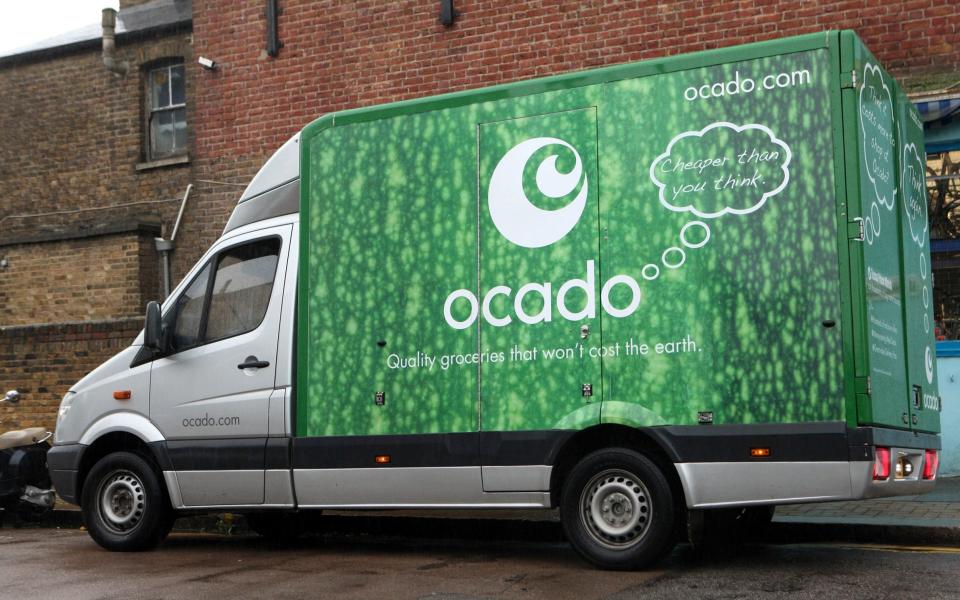Ocado forced into price war with Tesco as losses mount

Ocado is cutting prices on more than 10,000 products to better compete with rivals, after a slump in sales pushed the online grocer to a loss of more than £500m.
Ocado Retail, which is jointly owned by Ocado and Marks & Spencer, plans to match the price of thousands of products to Britain's biggest grocer, Tesco, saying it knew "how important value is to [customers] right now".
The discounting is part of an increasingly intense price war in the supermarket sector as grocers compete for customers. The cost-of-living crisis has prompted people to shop around, leading to an intense focus on price.
Tesco and Sainsbury's already have price matching guarantees with Aldi and Morrisons has announced two rounds of price cuts already so far this year.
British supermarkets are slashing or matching prices as German discounters grow rapidly, with Aldi recently overtaking Morrisons to become the fourth biggest supermarket in Britain.
Tim Steiner, chief executive of London-listed Ocado, said his company would only be able to price matching to Aldi on a much narrower range, arguing that copying Tesco’s allowed a broader range of lower prices.
He said: "If you try to match just against Aldi, you can only do that on a few 100 products."
The new strategy was announced alongside what City analysts called a “dismal” set of results.
Ocado Retail lost £4m in the year to November, compared to a profit of £150m in the same period 12 months prior.
The online store is scrambling to get people to spend more as basket sizes shrink. Average spending per shop dropped by 8.5pc over the year despite inflation pushing up the cost of a typical grocery shop.
Mr Steiner claimed Ocado had a "strong performance in a bad year".
He said: "Obviously it is re-adjusting to a post-pandemic world with a cost-of-living crisis thrown in."
The London-listed Ocado business part-owns Ocado Retail and sells its own robot warehouse technology to other retailers. Losses at the wider business hit £501m for the year to the end of November, compared to £177m a year earlier.
Ocado pressed pause on the roll-out of new warehouses in Britain late last year as part of a "more prudent" approach to how many sites it needs.
Mr Steiner said the plan was to fill up existing space before opening new sites.
Ocado shares slumped 8pc on the update and have lost nearly 60pc of their value over the last 12 months. The stock surged during the pandemic as grocery shopping shifted online but Ocado has been stung as buying patterns normalised.
Despite the fall in basket size, Ocado Retail gained more shoppers last year. The number of customers rose 13pc to 940,000.
Shore Capital analyst Clive Black called the results "truly dismal", writing in a note: "We continue to look for the rainbow and whether or not a pot of gold is evident. We have our doubts."
Grocery prices rose at their fastest pace on record last month, data from Kantar showed, fuelled by ongoing supply issues around eggs. Asda is still limiting how many egg cartons customers are allowed to buy in one go, months after supermarkets began to suffer shortages following an exodus of farmers.
Farmers in England and Wales are producing the lowest number of eggs on record, according to government figures, down almost 20pc year-on-year in the last three months of 2022. Kantar said prices were rising fastest for milk, eggs and margarine.
Grocery prices were 17.1pc higher in the four weeks to February 19 compared with a year ago, adding £811 to the average annual food bill. Morrisons was the only grocer to record a fall in sales for the period, down 0.9pc. Ocado, Kantar said, put in a "strong performance" last month, although its market share still stands at just 1.9pc of the market.
